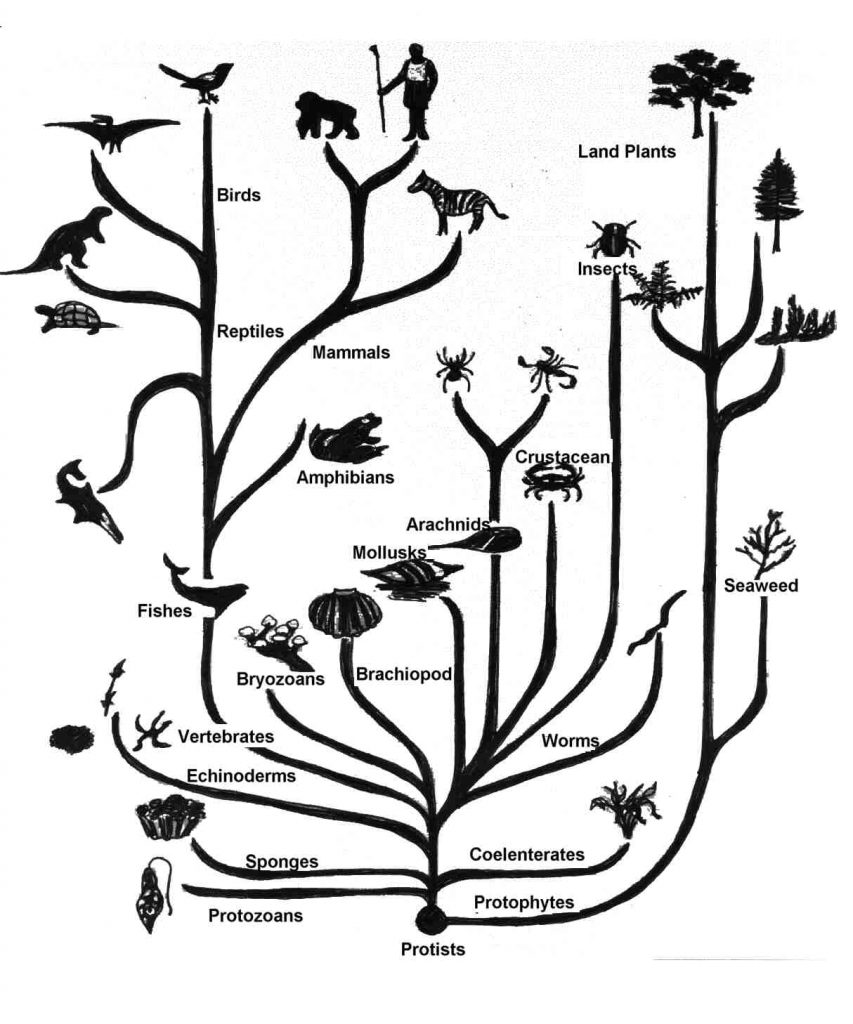
We cannot allow this profound anniversary to pass without comment.
This month marks the 150th anniversary of the publication of Charles Darwin’s On the Origin of Species, a book that simultaneously thrilled and scandalized the Christian world even as it failed to deliver on the promise its title made. (The text did many things, but explain the phenomenon of distinct and separate species it did not.)
This past week was also Darwin’s 200th birthday. We don’t need to play out the same old arguments and debates here. The positions are well marked and each side is so fully entrenched that no significant movement seems possible in the near future. I only want to comment on the phenomenon of the debate itself, to call attention to the somewhat odd fact that here rather than somewhere else Biblical literalists have chosen to stake out a position. The more you know about the history of this fight, the more arbitrary it seems. So let’s back up for a moment and think about the costs that we Evangelicals pay for this war. Let’s look at the collateral damage.
If the Bible cannot be trusted in all things (science, history, biology) then, we are asked, how can we trust it in anything? I would suggest that we trust the Bible just as we trust other authorities. We honor it for what it is but recognize that it has its limits. I trust my mother’s moral compass without reservation, knowing that the mistakes she makes are due to lack of knowledge or short sightedness, never to malice or bad intent. Nevertheless, I do not go to her with all my concerns and questions because on many topics she would be out of her depths. Similarly I trust my plumber with leaks, my doctor with aches, and my lawyer with suing the former when they fail, but I do not ask my doctor to solder my pipes or my plumber to diagnose my gall stones. Honestly, inflated rhetoric aside, don’t we all do the same with the Bible?
“But wait,” the literalists cry, “by deciding when and where you’ll trust the Bible, you’re leaning on your own understanding. You’re deciding when the Bible is relevant. That’s cafeteria Christianity.”
Yes.
You have to give the literalists and Fundamentalists credit for accurately describing our situation. When we ourselves judge the adequacy and reliability of the Bible to speak authoritatively on a given subject, we put ourselves in a position of judgment. We accept the charge and responsibility for making a decision. We accept the responsibility!

So I take responsibility for choosing what to eat and wear on any given day and do not turn to holy writ. I did not consult the Bible in a direct fashion when choosing a college, applying for a job, or picking a place to live. Nor shall I consult the Bible if I’m curious about the formation of the continents, the reality of global climate change, the origins of matter, or the billions of years of terrestrial history that predate the text of Genesis. It does not provide direct answers to these questions. Anyone who suggests that one can or should”take or leave” the entire Bible without at minimum using one’s own judgment to decide when the text is relevant is either blatantly dishonest or plain silly. That isn’t how scripture works.
Scripture works as a partner with whom we develop a deep relationship. We do not read it cover to cover collecting factual nuggets and prohibitions along the way as if it were a mathematical textbook. We read, and react, and pray, and read, and think, and apply, and fail, and read again throughout our lives. And in the process, through trial and error (lots of error!) it does its work on us. It knocks us around, and batters us about, and even sometimes gently chastens and molds our actions until we find that we are biblical people. It is not a tool to be carried on one’s hip, or a sword to be drawn when we need a quick fix or sharp retort – If you too had to do countless “sword drills” at church camp, then you know the reference I’m making here. When we treat scripture as an answer book, we actually fail to take it seriously enough. When we require literal truth from every word we refuse to let the Bible work on us, and force the text to work on our terms instead of its own. Imagine that! Imagine if I were to demand of my mother that she provide me with the kinds of answers I want, on my terms. As a southern gentleman I dare not imagine it – in truth I am more than a little scared of what my momma might say.
Personally, I don’t doubt that the broad outlines of “Darwin’s dangerous idea” – a very helpful turn of phrase from Daniel Dennett – are true. And this of course means that I cannot take the Genesis stories as historically accurate. The demand that I do so if I am to wear the badge of a “Biblical Christian” is as questionable as requiring me to respect my mother’s judgment in all matters in order to be considered a loving son. But the demand of the biblical literalists that we condemn Darwin’s work as antithetical to Christian faith and reject as implausible 99% of contemporary astronomy, geology, biology, and physics yields its most horrible fruit when we look around and note the castoffs who simply cannot in good faith darken the door of a church any longer: the human collateral damage.
There are hundreds of thousands, if not millions, of these Christians in the English speaking world alone, who grew up in Bible-blessed Evangelical churches. They (and I should probably switch pronouns at this point and say “we”) have no desire to attend churches that don’t keep the Bible front and center, churches that are more comfortable with Emerson and Donne than they are with Jeremiah and John. But we are thinking people, people who sought out an education and engaged the world precisely because we felt that is what the Gospel called us to do. However, in so doing we have gained enough wisdom and knowledge to know better than to pretend that our universe is less than 10,000 years old. And if the entrenched position of the Creationists and young earth crowd are the only viable option for a Christian who wants to take the Bible seriously – well, we would rather suffer in the void between congregations trying to find what sustenance in the Bible we can on our own than squirm uncomfortably in the pews as we hear patently ridiculous claims made on behalf of a text we cherish.
But when the poetry has been packed away and the harsh prosaic world returns, I am still faced with the reality of my own responsibility. I am and must remain responsible for the decisions I make, and this includes the decision regarding what to make of the Bible. The point that so often passes the literalists by is the fact that we are all in the same condition. The person who decides to put aside his or her own agency and “follow the whole Bible” is still making a decision. They are still responsible for the choice they make and their refusal to exercise their own agency beyond the bare minimum.
I am reminded here of Matthew 25 and the parable of the lost talents. In this story Jesus imagines three servants, each charged with investing a portion of the master’s wealth while he is away. When the master returns he rewards both of the servants who made money, but condemns the servant who was too scared to exercise any prerogative by burying his talent in the ground. “Look,” he seems to say, “I refused to exercise my own judgment and take responsibility.” The third servant refused to accept his obligation and thus avoided any risk – and he is condemned.
How dare we refuse to take responsibility to use what God has given us? How dare we refuse to exercise our own judgment and instead opt for the easy road of “taking or leaving the entire Bible.”
So, 150 years later many of us are still a little “weirded-out” (fancy science term) by the idea that we have ape-like primates for ancestors and fish for relatives, but we’ll get over it. The “ick factor” (technical physics phrase) remains. But we’ll get over it. My hope is that in another 150 years we will be well on our way to getting over our need to make the Bible give us the kinds of answers we want, and healing the damage done to the church by the refusal of so many of us to risk using our God-given talents.
So happy birthday Darwin. Thank you for challenging us with your tremendous insights. Some day soon, I pray, more Evangelicals will be able to join me in that sentiment.

